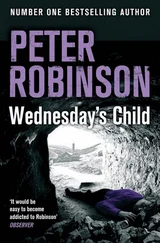“What was she like at school?” Jenny pressed on.
“Very bright,” answered Clive.
“She got three A-levels. Good marks, too. As and Bs,” added Hilary.
“She could have gone to university,” Clive added.
“Why didn’t she?”
“She didn’t want to,” said Clive. “She wanted to get out in the world and make a living for herself.”
“Is she ambitious?”
“She’s not greedy, if that’s what you mean,” Hilary answered. “Of course she wants to get on in the world like everyone else, but she doesn’t think she needs a university degree to do it. They’re overrated, anyway, don’t you think?”
“I suppose so,” said Jenny, who had a BA and a PhD. “Was she studious when she was at school?”
“I wouldn’t really say so,” said Hilary. “She did what she had to do in order to pass, but she wasn’t a swot.”
“Was she popular at school?”
“She seemed to get on all right with the other children. We got no complaints from her, at any rate.”
“No bullying, nothing like that?”
“Well, there was one girl, once, but that came to nothing,” said Clive.
“Someone bullying Lucy?”
“No. Someone complaining she was being bullied by Lucy, accused her of demanding money with threats.”
“What happened?”
“Nothing. It was just her word against Lucy’s.”
“And you believed Lucy?”
“Yes.”
“So no action was taken?”
“No. They couldn’t prove anything against her.”
“And nothing else like that occurred?”
“No.”
“Did she take part in any after-school activities?”
“She wasn’t much a one for sports, but she was in a couple of school plays. Very good, too, wasn’t she, love?”
Hilary Liversedge nodded.
“Was she wild at all?”
“She could be high-spirited, and if she got it in her mind to do something, there was no stopping her, but I wouldn’t say she was especially wild .”
“What about at home? How did you all get along?”
They looked at each again. It was an ordinary enough gesture, but it unnerved Jenny a bit. “Fine. Quiet as a mouse. Never any trouble,” said Clive.
“When did she leave home?”
“When she was eighteen. She got that job at the bank in Leeds. We didn’t stand in her way.”
“Not that we could have,” added Hilary.
“Have you seen much of her lately?”
Hilary’s expression darkened a little. “She said she’s not been able to get over here as much as she’d have liked.”
“When was the last time you saw her?”
“Christmas,” answered Clive.
“Last Christmas?”
“The year before.”
It was as Pat Mitchell had said; Lucy had become distanced from her parents. “So that’s seventeen months?”
“I suppose so.”
“Did she telephone or write?”
“She writes us nice letters,” said Hilary.
“What does she tell you about her life?”
“About her job and the house. Just normal, ordinary sorts of things.”
“Did she tell you how Terry was doing at the school?”
This exchanged look definitely spoke volumes. “No,” said Clive. “And we didn’t ask.”
“We didn’t approve of her taking up with the first boy she met,” said Hilary.
“Did she have other boyfriends before Terry?”
“Nobody serious.”
“But you thought she could do better?”
“We’re not saying there’s anything wrong with Terry. He seems nice enough, and he’s got a decent job, good prospects.”
“But?”
“But he seemed to sort of take over, didn’t he, Clive?”
“Yes. It was very odd.”
“What do you mean?” Jenny asked.
“It was as if he didn’t want her to see us.”
“Did he or she ever say that?”
Hilary shook her head. The loose skin flapped. “Not in so many words. It was just an impression I got. We got.”
Jenny made a note. To her, this sounded like one of the stages of a sexually sadistic relationship that she had learned about at Quantico. The sadist, in this case Terry Payne, starts to isolate his partner from her family. Pat Mitchell had also suggested the same sort of progressive separation from her friends.
“They just kept to themselves,” said Clive.
“What did you think of Terry?”
“There was something strange about him, but I couldn’t put my finger on it.”
“What sort of person is Lucy?” Jenny went on. “Is she generally trusting? Naïve? Dependent?”
“I wouldn’t really describe her in any of those terms, would you, Hilary?”
“No,” said Hilary. “She’s very independent, for a start. Headstrong, too. Always makes her own decisions and acts on them. Like about not going to university and getting a job instead. Once she’d made her mind up, she was off. It was the same with marrying Terry. Love at first sight, she said.”
“You weren’t at the wedding, though?”
“Hilary can’t travel anymore,” said Clive, going over and patting his wife’s inert form. “Can you, love?”
“We sent a telegram and a present,” Hilary said. “A nice set of Royal Doulton.”
“Do you think Lucy lacks confidence, self-esteem?”
“It depends on what you’re talking about. She’s confident enough at work, but not so much around people. She often becomes very quiet around strangers, very wary and reserved. She doesn’t like crowds, but she used to like going out with a small group of friends. You know, the girls from work. That sort of thing.”
“Would you say she’s a loner by nature?”
“To some extent, yes. She’s a very private person, never told us much about what was going on or what was going through her mind.”
Jenny was wondering whether she should ask if Lucy pulled the wings off flies, wet her bed and set fire to the local school, but she couldn’t find an easy way to get around to doing it. “Was she like that even as a child?” she asked. “Or did her need for solitude develop later in life?”
“We wouldn’t know the answer to that,” said Clive, looking over at his wife. “We didn’t know her then.”
“What do you mean?”
“Well, Lucy wasn’t our daughter, not our natural daughter. Hilary can’t have children, you see. She’s got a heart condition. Always has had. Doctor said childbirth could kill her.” Hilary patted her heart and gave Jenny a rueful look.
“You adopted Lucy?”
“No. No. We fostered her. Lucy was our foster child. The third and last, as it turned out. She was with us by far the longest and we came to think of her as our own.”
“I don’t understand. Why didn’t you tell the police this?”
“They didn’t ask,” said Clive, as if that made it all perfectly reasonable.
Jenny was stunned. Here was an essential piece of information in the puzzle that was Lucy Payne, and nobody else on the team knew it. “How old was she when she came to you?” Jenny asked.
“Twelve,” said Clive. “It was in March 1990. I remember the day as if it were yesterday. Didn’t you know? Lucy was one of the Alderthorpe Seven.”
Annie lounged back in her hard wood chair as if it had been molded to fit her shape, and stretched out her legs. Banks had always envied the way she managed to seem so centered and comfortable in almost any environment, and she was doing it now. She took a sip of her Theakston’s bitter and almost purred. Then she smiled at Banks.
“I’ve been cursing you all day, you know,” she said. “Taking your name in vain.”
“I thought my ears were burning.”
“By rights they should have both burned off by now.”
“Point taken. What did Superintendent Chambers have to say?”
Читать дальше












